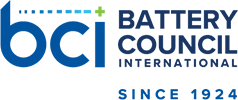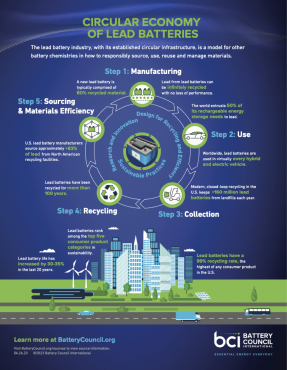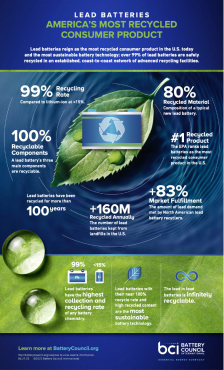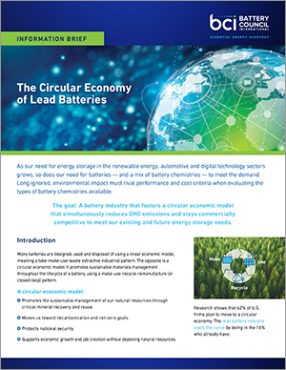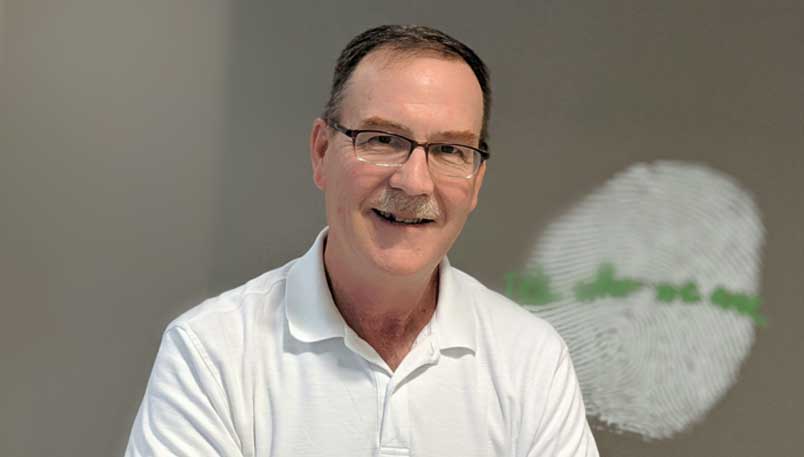
Proper battery management is on the agenda for local governments, and rightly so. Most essential products and devices rely on some type of battery for power. If it’s lithium-ion, safe disposal is a concern. So is sourcing. By 2021, China will control an estimated two-thirds of the global lithium cell production capacity, according to BloombergNEF.
What we do with our batteries and electronics at the end of their lives is fueling one of the biggest emerging problems in the world of waste. Recently, Battery Council International (BCI) was invited by the Metropolitan Washington Council of Governments (COG) to provide information on best battery management practices for community recycling operations. BCI member Tod Lyons gave an informative presentation at the capitol titled, “The Dangers of Lithium Batteries in Lead Battery Waste Systems.”
Lyons is particularly experienced in the topic. He is the sustainability manager for Interstate Batteries Recycling, based in Dallas. He also serves on BCI’s Communications Committee and chairman its Lithium Battery Awareness Sub-Committee, educating businesses and organizations about lead battery sustainability and the proper recycling and handling of automotive and other batteries.
Lyons explained that as lithium batteries become more prevalent in smart phones, power tools and other portable devices, the batteries from these discarded devices have led to a significant increase in fires at municipal waste and metal recycling facilities. The number of fires at waste facilities across the U.S. and Canada increased by 26% from 2016 to 2019, according to Ryan Fogelman, vice president for strategic partnerships at Fire Rover, a company that makes fire prevention systems.
Conversely, lead batteries are considered the most recyclable and one of the safest battery chemistries; they do not share the volatility associated with lithium batteries. However, when lithium batteries enter the lead battery recycling stream, they pose a serious threat to lead battery recyclers’ employees and equipment. Lithium batteries can explode when crushed during the lead battery recycling process.
Furthermore, the closed-loop nature of lead batteries ensures a stable domestic supply chain. In the U.S., lead batteries maintain a 99% recycling rate via a well-established recycling process uniquely designed for lead batteries. That allows U.S. lead battery manufacturers to source 73% of their lead supply chain inputs from domestic recyclers.
Lyons said that the advent of different battery chemistries being introduced globally as another means of backup storage power, makes it important to know the differences between battery chemistries. That includes the dangers that could result in improper handling.
Following the presentation, Lyons and BCI’s Executive Vice President Roger Miksad answered several questions from attendees regarding regulations and best management practices for handling and recycling spent batteries. Other speakers on the program included a webinar presented by Sean Plasse of Call2Recycle and a presentation by Jesse Maxwell from the Solid Waste Association of North America.
About 30 COG members attended the meeting either in person or by phone. COG is the local government association for the Washington, D.C., area and includes recycling managers from the various cities, counties and federal government agencies in the metropolitan regions.
Sources and Resources
PDF of Presentation: The Dangers of Lithium Batteries in Lead Battery Waste Systems
PDF of Presentation: The Dangers of Lithium Batteries in Lead Battery Waste Systems
Lithium Training Materials
Metropolitan Washington Council of Governments Recycling Committee
Recycling Plants are Catching on Fire, and Lithium-Ion Batteries are to Blame
2019 Report: Annual Reported Waste & Recycling Facility Fires US/CAN
In Loving Memory: Industry Loses a Valued Contributor, Tod Lyons, Interstate Batteries Recycling
Last month the industry lost a strong advocate for lead batteries and recycling, the country lost a patriot, and his community and family lost a loving father and husband. Tod Lyons, communications and sustainability manager with Interstate Batteries Recycling, lost his valiant battle with cancer. BCI met Tod through his generous gift of time and talent to the Advancing Lead Batteries Communications Initiative. Tod was a valued member of the group for more than two years shared his deep experience in communications and his positive outlook with the ALBCI management team, and was appreciated by all.
In sharing the sad news, David Willis, IBR, said “You may not know, as Tod did not talk about himself, however he spent 20 years in the Coast Guard as a first responder and communications officer at disaster sites. He was first on site at 9/11 for a heroic week of service. He was passionate about those that served this country and worked tirelessly to honor them. Everyone at Interstate Batteries are honored to have served alongside Tod for the past 11 years. Tod’s contribution to the industry, Interstate Batteries and so many of us individually, will be missed.
We echo those sentiments. His family suggests that for those who wish to honor Tod they make contributions to The Murphy Veterans Tribute. Tod worked hard to launch this organization.
” target=”_blank” rel=”noopener noreferrer”>Lithium Training Materials
Metropolitan Washington Council of Governments Recycling Committee
Recycling Plants are Catching on Fire, and Lithium-Ion Batteries are to Blame
2019 Report: Annual Reported Waste & Recycling Facility Fires US/CAN
In Loving Memory: Industry Loses a Valued Contributor, Tod Lyons, Interstate Batteries Recycling
Last month the industry lost a strong advocate for lead batteries and recycling, the country lost a patriot, and his community and family lost a loving father and husband. Tod Lyons, communications and sustainability manager with Interstate Batteries Recycling, lost his valiant battle with cancer. BCI met Tod through his generous gift of time and talent to the Advancing Lead Batteries Communications Initiative. Tod was a valued member of the group for more than two years shared his deep experience in communications and his positive outlook with the ALBCI management team, and was appreciated by all.
In sharing the sad news, David Willis, IBR, said “You may not know, as Tod did not talk about himself, however he spent 20 years in the Coast Guard as a first responder and communications officer at disaster sites. He was first on site at 9/11 for a heroic week of service. He was passionate about those that served this country and worked tirelessly to honor them. Everyone at Interstate Batteries are honored to have served alongside Tod for the past 11 years. Tod’s contribution to the industry, Interstate Batteries and so many of us individually, will be missed.
We echo those sentiments. His family suggests that for those who wish to honor Tod they make contributions to The Murphy Veterans Tribute. Tod worked hard to launch this organization.
